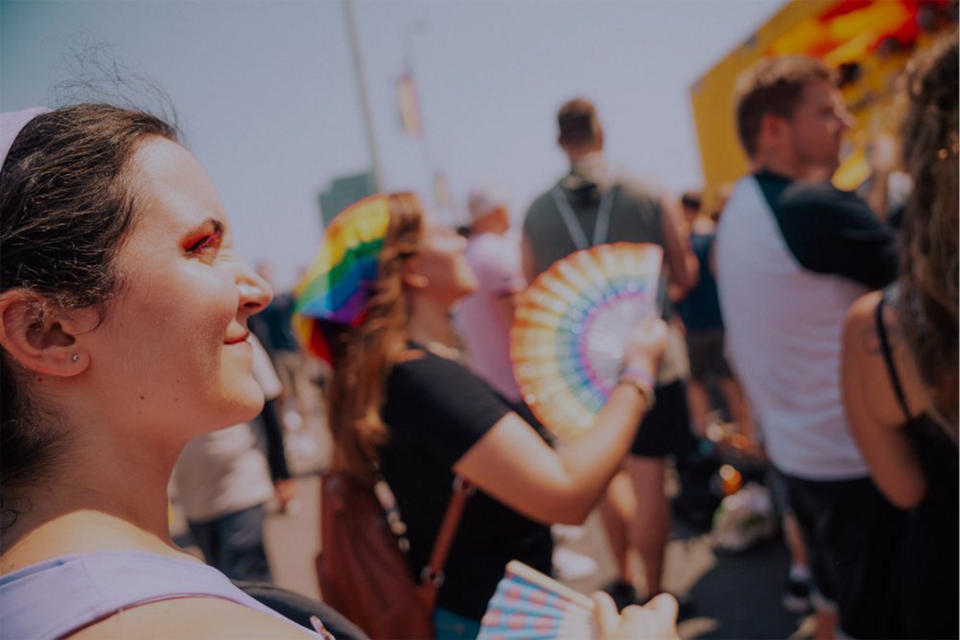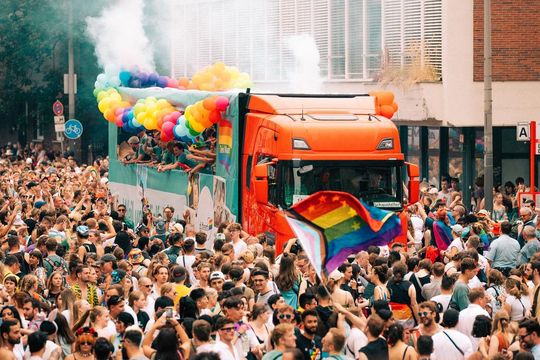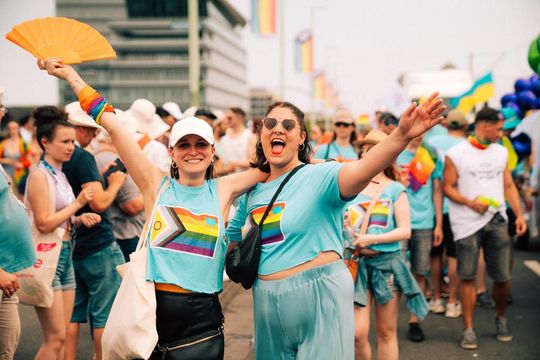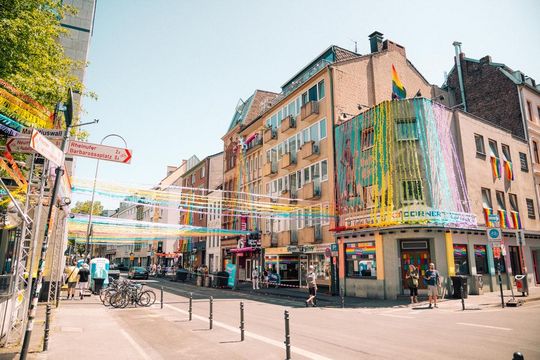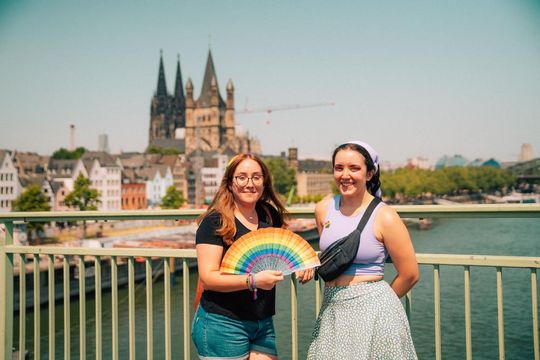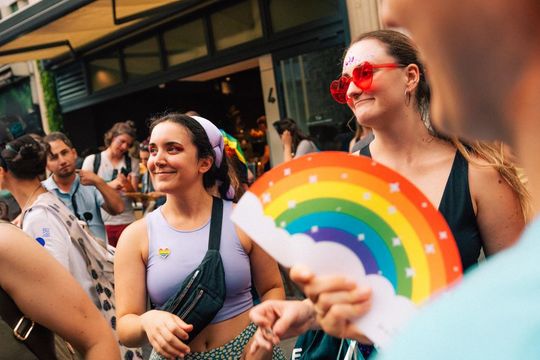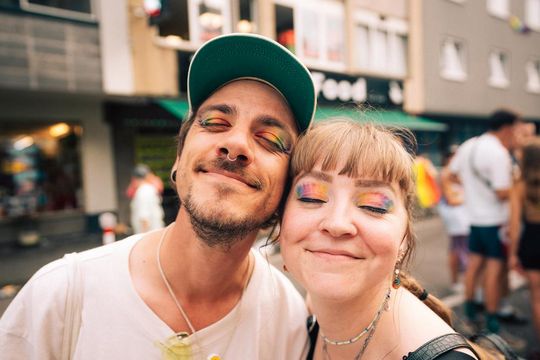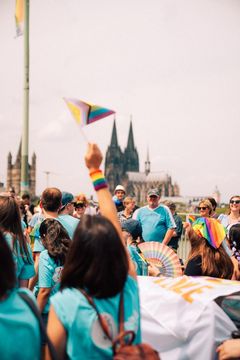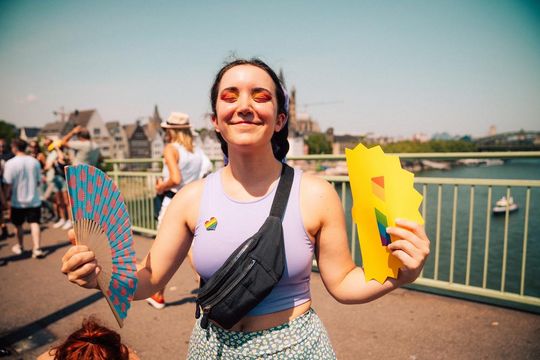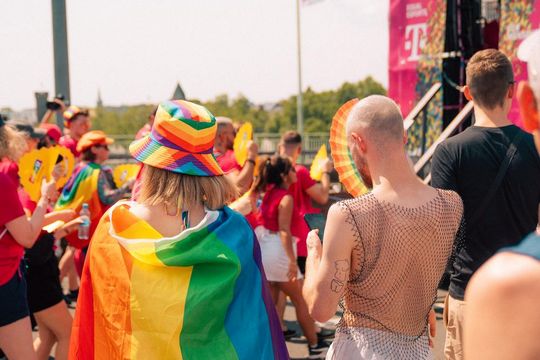
Pride parades in Germany – Pride vs Prejudice
Every year, hundreds of thousands of people hit the streets in cities around the globe to champion diversity, equality and tolerance in an inescapable fury of colour and sound. In Germany alone, Christopher Street Day events – as pride parades are generally called here – take place in more than 100 cities.
Colourful atmosphere
Bright rainbow flags everywhere you look, bass beats that thrill to the core, and people in party mode all around – a pulsating atmosphere of utter exuberance and joy. All that and more is what awaits you on Christopher Street Day (CSD), a regular fixture in the summer events calendar of many cities in Germany. But CSD parades mean so much more than just fun and entertainment. They are about tolerance, respect, diversity and equality – every person’s right to love whomever they wish, of whatever sex or gender, without fear of discrimination or violence. This should go without saying, and in many parts of society it does – but acceptance is still far from universal.
Germany is a fairly open and tolerant society by international standards, a reputation due in large measure to the queer metropolitan cultures of cities like Berlin, Cologne, Frankfurt and Hamburg. But there is still hostility and hate, a fact that the LGBTQIA+ community has been highlighting at CSD events for over 50 years as part of their ongoing campaign for change and equality.
LGBTQIA+
The legal Framework is clear:
Germany’s human rights legislation, meanwhile, is very clear, with statutes like the General Act on Equal Treatment (Allgemeines Gleichbehandlungsgesetz, or AGG for short) guaranteeing equal rights for all, regardless of gender and sexual orientation. In other words, it’s illegal to discriminate against people who identify as lesbian, gay, bi, trans, queer, intersex or asexual.
Christopher Street Day (CSD)
…the name is interestingly, despite its US origins, not commonly used outside Germany and Switzerland. More common is „pride day“ or just „pride“
Origins: The gay and lesbian liberation movement comes to Germany
CSD traces its origins back to 1969, in Greenwich Village, New York City. At that time, the New York police were in the habit of raiding bars frequented by homosexuals and transexuals, and those who found themselves in the wrong place at the wrong time risked arrest and being publicly outed in the worst way possible. In the early hours of 28 June 1969, patrons of the Stonewall Inn on Christopher Street fought back against this police brutality and arbitrary use of state power. Their spontaneous protest gained widespread support in the Village, and there followed several days of street riots in what has come to be known as the Stonewall uprising. These events are widely regarded as a watershed moment for the LGBTQIA+ community in their struggle for recognition and equality. For many, they mark the beginning of the gay and lesbian liberation movement.
1979 – The first pride demonstrations in Germany
Stonewall inspired numerous large demonstrations in many cities around the world. The first CSD or pride parades in Germany took place in 1979 – in Berlin and Bremen. These initial events were attended by several hundred people, a number that would increase many-fold over the coming years. One of the key demands voiced in these early years was the repeal of Paragraph 175 of the German Criminal Code, which made homosexual acts between men a crime. But, as in most countries, the wheels of the law turn slowly, and it wasn’t until 11 June 1994 that this provision was finally expunged from the statute books.
Pride turnout in Berlin tops one million
Today, the biggest pride parades in Germany take place in Cologne, Berlin, Hamburg and Stuttgart, with each event attracting several hundred thousand supporters. In 2019, the 50th anniversary of Stonewall, the organisers of the pride parade in Berlin counted around a million people. Not that the parades are just a big-city thing. In the summer months, people also take to the streets to demand their rights in smaller cities.
One of Germany’s regular parade-goers is Lilit, who is a student in the northern city of Flensburg. Her first time was in 2018 at a Pride parade in Amsterdam, and since then she has taken part in pride parades in Hamburg and Flensburg. ‘The feeling I had was of being somewhere where people are free and can express themselves openly without any hang-ups about their outfit, hairstyle or physical appearance,’ she says. ‘The first time, I was dressed fairly simply, but after that I really went to town with the make-up. It was wonderful.’
In Lilit’s home country, Armenia, these sorts of parades are illegal. ‘I identify as part of the LGBTQIA+ community, so for me personally, it was really important to go to the parade and show my solidarity.’
About Lilit
Lilit works in Flensburg, Schleswig-Holstein, as a language and culture mediator for Ukrainian refugees. She also has a job at Flensburg University of Applied Sciences, where she is studying digital media information technology, majoring in film.
First time at a pride parade?
Are you planning on going to your first pride parade and wondering if there are any particular dos and don’ts? According to , the main thing is just to go with the flow and be prepared for a bit of a culture shock. ‘It’s okay for people to get their message across by dressing up or cultivating a certain look,’ she says. ‘Oh yeah, and don’t forget to bring banners and placards with messages like “Love Is Love” or “Make Love, Not War”.’
About Roberta
Roberta studies English Studies in the colourful metropolis of Cologne. She contributes to various social projects and it is important to her that you face your insecurities and have an open mind.
took part in Cologne’s Christopher Street Day and watched the pride parade: „If I had expectations, they were certainly exceeded. I have never seen Cologne so alive, surrounded by such wonderful people. I have never been to an event or parade where so much love could be felt and seen. The people in the city seemed so full of life to me at this event. At no parade and no event have I ever felt and seen so much love as at the CSD.“
The atmosphere was magnificent!
Roberta about taking part in Cologne's Pride Parade
For , love and acceptance are what the parade is all about: ‘No-one should be made to feel ashamed of their sexuality. We’re all different, and the parades are a show of solidarity with that.’
Pride events are discrimination-free zones. And with each parade as colourful and diverse as the people taking part, there is always something for everyone. You’ll encounter show acts, live music, political rallies, marches, and elaborately decorated floats. Many of the revellers and demonstrators will be wearing outrageously vibrant costumes and sporting banners displaying messages in a bold and unmistakeable statement about the true diversity of society. So, don’t be shy about being colourful and risqué with your own outfit. There is no official dress code – or fashion orthodoxy, for that matter – to hamper your creativity. ‘Tolerance is progressive for society, but homophobia is corrosive,’ Lilit explains. ‘Annual pride parades help build more tolerance, and I am all for that.’
So, when and where is the next pride event? If you’re looking for information on upcoming events, the nationwide umbrella organisation Dachverband CSD Deutschland e.V. is a good place to start. If you’re setting up a club or group, you can affiliate it with CSD by filling in a membership application form on the CSD website. As an individual, you can also volunteer as a helper at a local event – simply go to the website of your local CSD and fill in the form.
LGBTQIA+ communities at German higher education institutions
Most German higher education institutions have offerings for the LGBTQIA+ community. These range from group barbecues and cooking events to specialised counselling services. They are often organised by students and fall within the remit of the university’s Allgemeiner Studierendenausschuss (AStA) – the executive body of the student union. Check your university’s website for details. Your student union may also organise activities in relation to pride events, such as entering a float in a parade. There might even be groups of parade-goers that you can tag along with, so it pays to ask around.
Many universities also have gender equality or LGBTQIA+ offices whose role it is to ensure that students can go about their studies free of discrimination – so don’t be afraid to reach out if you feel you have been discriminated against. ()
Tips for getting to pride events
It pays to travel by local public transport and make sure you arrive at the parade venue in plenty of time, especially if it’s one of the larger parades that attract several hundred thousand participants. Check the website of the pride event you’re attending for details of the parade route and how best to get to the starting point.
Helpful links
In line with this topic
Kickstart your professional career
